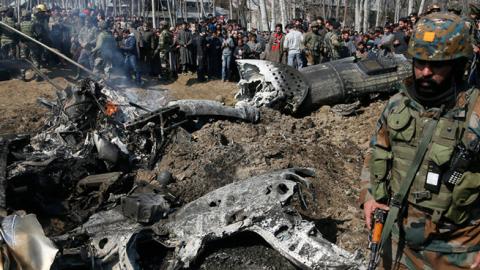On Friday, Pakistan released an Indian pilot shot down in Pakistani-controlled territory amidst rising hostilities. But the peace gesture, as Pakistani Prime Minister Imran Khan "called it":https://www.washingtonpost.com/world/asia_pacific/trump-expect-reasonab…, is unlikely to end the conflict between the two nuclear-armed neighbors. There appears to be international consensus that, to truly end hostilities, Pakistan must shut down support for terrorist groups whose actions have brought India and Pakistan to the brink of war several times over the past two decades.
Since 1999, crises between India and Pakistan have tended to evolve in four stages. First, eager to get international attention for the dispute over Kashmir, a Pakistan-based militant group launches an attack in India or Indian-controlled Kashmir. Then India threatens retaliation, which in the past involved mobilization of troops along the Pakistan border but this time comprised an air strike on a terrorist training camp inside Pakistan. Faced with Indian threats, Pakistan raises the specter of nuclear confrontation and asks the United States and other major powers to help defuse the situation. Finally, American diplomacy provides Pakistan a face-saver, and the threat of war subsides.
This scenario played out in 1999, during the "Kargil crisis":https://www.washingtonpost.com/archive/politics/1999/07/17/border-confl…. It was repeated after the "attack":https://www.washingtonpost.com/archive/politics/2001/12/14/gunmen-with-… on India’s Parliament in December 2001 and again following the "carnage":https://www.nytimes.com/2008/11/27/world/asia/27mumbai.html at several Mumbai hotels in November 2008.
As Pakistan’s ambassador to the United States during the Mumbai attacks, I witnessed firsthand the American efforts to smooth out India-Pakistan tensions. President George W. Bush, Secretary of State Condoleezza Rice and national security adviser Stephen Hadley spoke on the phone with prime ministers of both countries multiple times. The "CIA shared intelligence":http://www.washingtonpost.com/wp-dyn/content/article/2009/02/15/AR20090… that enabled Pakistan to arrest several individuals connected with the attacks. But after the immediate threat of Indian retaliation had passed, Pakistan backed away from "punishing":https://economictimes.indiatimes.com/news/defence/another-terror-attack… the attack’s masterminds and perpetrators.
In 2016, India tried to change the pattern by following a terrorist attack inside its territory with a "surgical strike":https://www.washingtonpost.com/world/india-hits-militant-launchpads-in-… against a terrorist launchpad across the de-facto border in Kashmir. Pakistan avoided escalation by pretending that the strike had not taken place.
As in 2016, the latest confrontation also deviates from the usual pattern. After a Feb. 14 "terrorist attack":https://www.washingtonpost.com/world/asia_pacific/at-least-18-killed-in… in Indian-controlled Kashmir, India undertook a retaliatory "strike":https://www.washingtonpost.com/world/pakistan-says-indian-fighter-jets-… on an alleged militant facility in Pakistan. Pakistan responded to India’s strike with an "air raid":https://www.washingtonpost.com/world/asia_pacific/pakistan-says-it-has-… of its own. It was while chasing the intruding Pakistani aircraft that the Indian pilot being released on Friday was shot down.
In military terms, Pakistan’s military-intelligence establishment counts on India’s fear of conflict escalating to the nuclear level while planning terrorist attacks. Instead of nuclear weapons being a deterrent to war, this approach allows for low-cost, low-intensity war, which can be carried on endlessly under a nuclear umbrella. But now India feels it has found a soft spot where it can strike — whether on ground using special forces, as in 2016, or using air strikes as they have in the current crisis — without crossing the threshold for all-out war between the nuclear powers.
These hostilities come amidst rising hyper-nationalist sentiment in both India and Pakistan. Politicians and "shrill anchors":https://thewire.in/media/indian-tv-medias-blatant-endorsement-of-hyper-… on Indian evening television talk shows have been clamoring for India to teach Pakistan a lesson over its support for terrorism. On the Pakistani side, national pride has been constantly invoked to assert that India cannot "dictate":https://nation.com.pk/02-Dec-2018/india-asked-not-to-dictate-pakistan-i… to Pakistan.
Yet Pakistan’s support for terrorist groups is well documented, even as it has been officially "denied":https://www.bbc.com/news/av/world-south-asia-15134305/pakistan-denies-i… by successive Pakistani governments. Pakistan-based groups, operating openly despite official bans, have often been eager to "claim responsibility":https://www.hindustantimes.com/india-news/jem-claiming-responsibility-o… for attacks inside India.
It might be a bitter pill to swallow for some Pakistanis, but Pakistan’s "30-year strategy":https://www.nybooks.com/articles/2000/10/19/kashmir-the-unending-war/ of supporting insurgents and militants in Kashmir has failed. Pakistan’s policy has made life more difficult for the Kashmiri Muslims it claims to support. Violence supported from across the border has resulted in an Indian clampdown and obscured international concern about human rights in Kashmir.
Moreover, most countries, including some of Pakistan’s few remaining friends abroad, failed to even mention Kashmir as an issue during the current imbroglio. "China":https://www.reuters.com/article/us-india-kashmir-china/china-expresses-…, Saudi Arabia and the United Arab Emirates — all of whom have recently promised significant amounts of loans and investment to help "bail out":https://www.bloomberg.com/news/articles/2019-01-25/saudi-u-a-e-loans-to… Pakistan’s troubled economy — "spoke":https://news.yahoo.com/saudi-vows-escalate-india-pakistan-tensions-kash… of the need for de-escalation but "said nothing":https://www.reuters.com/article/us-india-kashmir-china/china-expresses-… that could be construed as support for Pakistan’s stance on Kashmir.
In fact, world leaders seem to have changed their tack and ignored the well-worn four stages of previous India-Pakistan crises. For example, "Secretary of State Mike Pompeo":https://www.thehindu.com/news/international/us-urges-pakistan-to-take-m…, emphasized “the urgency of Pakistan taking meaningful action against terrorist groups operating on its soil” along with leaders of "France":https://twitter.com/francediplo_EN/status/1100441321213431810 and "Germany":https://timesofindia.indiatimes.com/india/japangermany-ask-indiapak-to-…, instead of focusing on finding a face-saver for Pakistan.
That means Pakistan can no longer link its tolerance or support for terrorist groups with the grievances of the people of Kashmir in hope of securing international attention or support. That — along with Indian attention to Kashmiri human rights concerns — might be the most effective means of avoiding recurrent India-Pakistan conflagrations in the future.


















